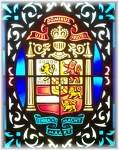Denominations: Necessary, Biblical?
 My mother was from a Methodist family which was once a mix of Presbyterian and Roman Catholic. My father's family was supposed to be Lutheran, but ended up Roman Catholic. We moved two doors down from a Reformed Church in America congregation, and so I grew up in that denomination, even attending an RCA college and seminary. Only in America can one find such a common story of Heinz 57 religious pedigree. I looked in vain for any Jewish or Byzantine relatives, but did find to my horror a Dutch great-grandmother.
My mother was from a Methodist family which was once a mix of Presbyterian and Roman Catholic. My father's family was supposed to be Lutheran, but ended up Roman Catholic. We moved two doors down from a Reformed Church in America congregation, and so I grew up in that denomination, even attending an RCA college and seminary. Only in America can one find such a common story of Heinz 57 religious pedigree. I looked in vain for any Jewish or Byzantine relatives, but did find to my horror a Dutch great-grandmother.Being a member of a denomination since I was four, I have appreciated the common life, heritage, and networks which comprise the RCA as a part of the body of Christ. I like the name "Reformed," which evokes Calvinism, reformation from Rome, and the doctrines of grace. On the other hand, I have had a front-row seat to all which is wrong in my denomination, wrongs shared by most other mainline Christian churches. I have observed a speedy decline in doctrinal orthodoxy, coinciding with a rise in ecumenism, feminism, and a widespread rejection of biblical authority. Our two seminaries are rife with heretical professors, non-biblical/theological curiculla, and each year pump out more and more young pastors hostile to the historic Reformed faith as summarized in our creeds and confessions. The shadows are indeed lengthening, and our spiritual decline is matched only by our numerical decline, as God's people desire and seek out the pure milk and meat of the Word.
All of this has taken a toll on the spiritual health of individuals and congregations. Conformity, uniformity, and centralization of power in the RCA has left many wounded by the side of the road. When I was ordained, I thought I was leaving the corporate world for the sacred precincts of divine service, only to find the church lapping up every secular business trend it could find. I should have known something was amiss, when my final seminary class was taught by Max Dupree, a businessman and author. He told us to be efficient office managers. Now in my present classis, people are fussing about "Best Practices," and higher judicatories are implementing "Carver Governance Policy." I don't know a great deal about either, but I know enough to say they smell like smoke.
I have not yet mentioned the persecution of evangelicals in the seminaries, the difficulties of remaining composed at classis meetings, nor the misery of reading The Church Herald, which is a mouthpiece for the small, unelected cabal of liberals who control the denomination.
As my rhetoric grows more heated, one can sense that I am building to a position that denominations are not necessary. They are in fact mostly hindrances to ministry, false substitutes for the true church, engines of oppression and power, and without warrant in the Bible.
My admiration for John Owen is enormous, and his writings on the nature of the church have provided me both a great solace and a direct challenge to denominationalism. I hope to share some of what I have gleaned from Owen in my next post. I will leave you with Owen's definition of the church, which is taken from his Brief Instruction (1667):
"A society of persons called out of the world, or their natural worldly state, by the administration of the word and Spirit, unto the obedience of the faith, or the knowledge and worship of God in Christ, joined together in a holy band, or by a special agreement, for the exercise of the communion of saints, in due observation of all the ordinances of the gospel."



0 Comments:
Post a Comment
<< Home